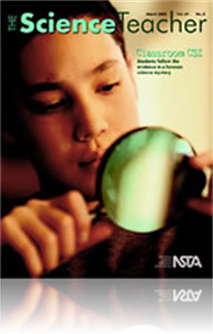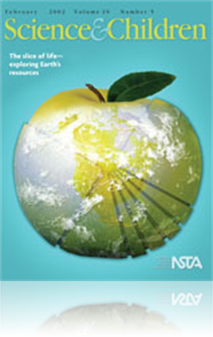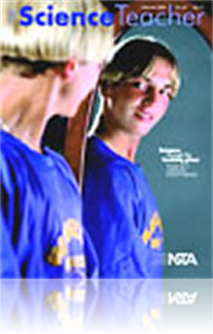All Resources
Journal Article
The authors suggest several ways to catch and hold student interest in physics. One excellent method is to use the television series Star Trek to extend the science curriculum. The beauty of this program is that the writers based their creations on k...
Journal Article
Snow Globe Science: Students learn solution chemistry through an open-ended lab investigation
Allowing students to experiment to make a product such as a snow globe encourages the development of problem-solving skills, and students learn the concepts behind solution chemistry by determining the best combination of materials for the snow globe...
Journal Article
Commentary: Our Apartheid—The Imperative of Multiculturalism in Science Education
An opinion piece about the lack of diversity in science. Courses, curricula, and classrooms must be more accessible and more friendly to include "science for all."...
Journal Article
Are your science textbooks still including the prototype for the space shuttle, Enterprise? If so, follow the authors’ favorite ways of incorporating different media into the classroom provided in this article. Cartoons, videos, DVDs, newspapers, a...
Journal Article
Countering Gender Bias in the Media
This inquiry-based activity raises student awareness of the inequity that exists in the way the media portrays the contributions of men and women. Students look at a variety of images of men and women engaged in different actitivities, and then make ...
Journal Article
Spanish-speaking young readers are eager to explore and understand the world. This selection of well written trade books in Spanish will satisfy young Spanish speakers' quest for knowledge....
Journal Article
Racing into Physics: Using creativity and physics to design race cars
Conceptual physics emphasizes analysis and analytical thinking skills. This article features an "Edible Race Cars" lab where students design, construct, and race their cars to learn about the concepts of aerodynamics, friction, acceleration, and spee...
Journal Article
Editor's Corner: Have You Hugged Your Student Teacher Today?
The Science Teacher’s editor shares helpful hints for science teachers who have "student teachers" in their classroom....
Journal Article
Outstanding Science Trade Books for Students K-12: Books Published in 2001
The books that appear in this annotated bibliography were selected as outstanding science trade books published in 2001. They were selected by members of a book review panel appointed by the National Science Teachers Association (NSTA) and assembled ...
Journal Article
Upper elementary students cut apples to explore the Earth. The goal of the activity is to teach children about the relatively small proportions of actual drinkable water, habitable land, and productive areas on the Earth....
Journal Article
Students work with various types of packing peanuts to investigate states of matter and chemical and physical changes. One of the activities involves making slime. The activities can easily be modified for students with learning disabilities....
Journal Article
"Clued In" to Their Environment
To help students become better acquainted with Florida’s natural environment, an environmental outreach program director developed an activity in which students would use a large canvas floor map of their state to learn about their environment as t...
Journal Article
Developing science process skills and participating in inquiry-based activities help students gain the foundation for job skills outside of school. Overall, this workshop was highly successful, and in-service teachers found that activities, especiall...
Journal Article
Commentary: Discovering Relationships
Science may indeed be built upon facts but without an understanding of how things are interconnected, students will never get the "big picture." In this article students study integrated science by focusing on discovering and understanding relationsh...
Journal Article
What Motivates Students in the Lab?
Four types of motivational methods were examined in this study: quizzes, scheduled presentations, unscheduled presentations, and a control. The quiz group showed the most significant and positive change. Because students’ grades were affected by th...
Journal Article
Giving Spatial Perception Our Full Attention
The authors present their opinions about left-brain and right-brain learners. According to them, left-brained students, who excel in spatial perception, are not given enough credit or attention in school. The authors urge educators to recognize both ...
Journal Article
Putting Assessment to the Test: Tips for designing standards-based tests
During the last decade significant changes occurred in the way we teach and assess learning. Both the National Science Education Standards (National Research Council, 1996) and the suggestions from Benchmarks from Scientific Literacy (American Assoc...
Journal Article
Outcomes assessment was conducted with a pretest/post-test design in an online nonmajors’ biology course that included laboratory and lecture components. Data were compared with those of students at the same college enrolled in the same course with...
Journal Article
Science on a Roll Part One: Absorbing Inquiry
Testing the absorbancy of different brands of paper towels is a popular activity for many grade levels. It is a simple, fun, and effective teaching tool for getting students involved in the process of science. The procedure directs students through a...
Journal Article
Editor's Corner: Science Poses Challenges to Every Demographic Group
The Science Teacher’s editor shares thoughts on the release of the Department of Education's National Center for Education Statistics latest science scores for grades 4, 8, and 12 from the 2000 assessment....
Journal Article
In 1997, Project JUST (Join Underrepresented in Science and Technology) was launched. This school system project increased the number of underrepresented minority students taking and completing high school science and mathematics courses. This articl...
Journal Article
The Case Study: The Way of Flesch
The 50-year-old book, The Art of Readable Writing, by Linguist Rudolf Flesch, is chock-full of great advice about writing. Here the author shares some of its wisdom because it is useful for any kind of writing, including case studies. Consider this c...
Journal Article
A full understanding of the mechanisms behind and the importance of scientific research is invaluable to all college students. The Mock Experiment can be used to introduce science and nonscience majors to the scientific process, presentation of resea...
Journal Article
What would happen if a person went into space without a spacesuit? Before learning the answer students must first understand the forces—gravity and atmospheric pressure. This article describes various demonstrations using a vacuum pump to investi...
Journal Article
Investigating Island Evolution: A Galapagos-based lesson using the 5E instructional model
Many endemic species of the Galapagos Islands are useful for a biology teacher planning an extended lesson on evolution. In this activity, the teacher focuses on his Galapagos Islands’ experience to develop a unique lesson plan, using the 5E instru...
Journal Article
Scope on the Skies: Watch your weight
This column focuses on astronomy throughout the year. This month’s issue focuses on gravity, one of the four forces in the universe that scientists refer to as a fundamental force....
Journal Article
Forensic investigations are a great way to involve middle school students in the inquiry process. In this activity students decide if the drowning was an accident or murder by examining microscopic evidence from the scene....
Journal Article
Thinking Outside the Block: An innovative alternative to 4x4 block scheduling
Block scheduling is a schedule composed of four 90-minute class periods in a day. This article focuses on the experiences of a high school's adoption of block scheduling but rethinking the block to a 4x1 block schedule—four 110-minute class periods...
Journal Article
Reflecting on a Misconception: Can students see a full-length image in a small mirror?
Looking at the reflection of our image in a mirror is so commonplace that most of us are unaware of the misconception we hold with respect to this phenomenon. This article provides an activity that will help students explore the concepts and relatio...









